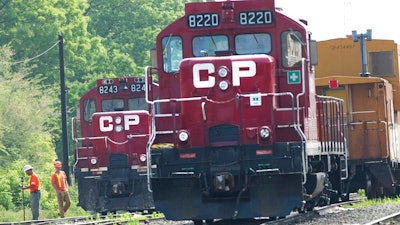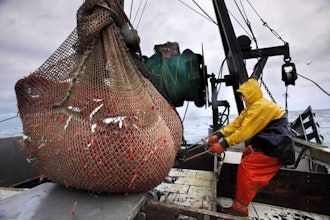
A bidding war is breaking out for Kansas City Southern, with Canadian National Railway making a $33.7 billion cash-and-stock offer for the railway.
The bid trumps a $25 billion cash-and-stock proposal made by Canadian Pacific last month.
Any deal would capitalize on growing trade across North America by creating the first railroad that would link the United States, Mexico and Canada. Last year the three countries entered into a revamped regional trade pact, negotiated by President Donald Trump, that is expected to encourage trade and investment across North America.
A surge in manufacturing is already benefitting the companies. According to a research report Monday from Stifel, the six major railroad all reported double-digit increases in volume over the past week compared with a year earlier when the coronavirus pandemic cut shipping volume sharply.
“These strong volumes, when coupled with other data points such as the ISM, should bode well for the economy,” analyst Benjamin Nolan wrote.
Shares of Kansas City Southern jumped nearly 16% by midday Tuesday. CN's stock fell 6%. Canadian Pacific's shares slipped 2%
CN said its offer is worth $325 per Kansas City Southern share. Kansas City Southern shareholders would receive $200 in cash and 1.059 shares of CN common stock for each share. The transaction would include about $3.8 billion in Kansas City Southern debt.
If the two companies were to combine, it would create a business connecting ports and rails in the U.S., Mexico and Canada.
“CN and Kansas City Southern have highly complementary networks with limited overlap that will enable them to accelerate growth in single-owner, single-operator, end-to-end service across North America," CN President and CEO JJ Ruest said in a statement.
A representative for Kansas City Southern didn’t immediately respond to an email seeking comment.
In contrast, Canadian Pacific said its proposed deal would create a combined company that would operate about 20,000 miles of railway, employ 20,000 people and generate annual revenue of about $8.7 billion.
Citi research analyst Christian Wetherbee said Canadian Pacific may respond with a higher bid, but he said whichever Canadian railroad misses out on acquiring Kansas City Southern could also end up trying to acquire another U.S. railroad.
“So while a bidding war is possible, it seems fairly likely that the loser of that war would have to look for another target, which could likely be CSX or Norfolk Southern,” Wetherbee said in a research note.
Canadian Pacific tried to acquire Norfolk Southern five years ago, but it abandoned that roughly $30 billion bid after it encountered strong opposition from Norfolk Southern, politicians, rail customers along the route and other railroads.
Wary U.S. regulators have not approved a major railroad merger since the 1990s, but industry analysts have said that Canadian Pacific’s proposed $25 billion acquisition of Kansas City Southern has a good chance of getting the green light because there is little overlap between the two lines.
The service problems and economic damage that followed railroad mergers in the 1990s are part of why regulators adopted tough rules for major railroad mergers in 2001. Regulators have said that, generally, any merger involving a major railroad must enhance competition and serve the public interest.
Edward Jones analyst Jeff Windau said Canadian National’s competing offer for Kansas City Southern would likely face tougher scrutiny from regulators because those two railroads both have north-south lines that cross the middle of the country down to the Gulf Coast where Canadian Pacific doesn’t have any routes that directly compete with Kansas City Southern’s network.
“There’s the potential of viewing that as essentially eliminating a competitor down the central part of the United States,” Windau said. “We think that potential for viewing that as reducing competition could be increasing the regulatory hurdle in the Canadian National case.”
Windau said the deal could also face more scrutiny because Canadian National is bigger than Canadian Pacific, so the deal could be seen as making Canadian National an even stronger competitor.






















